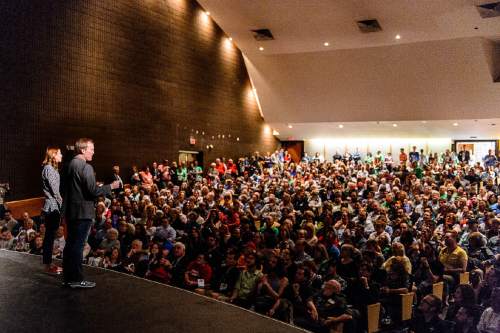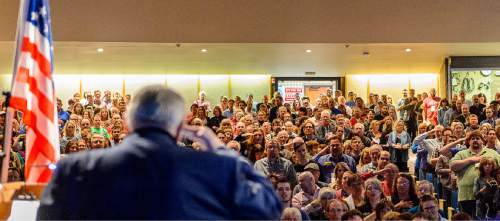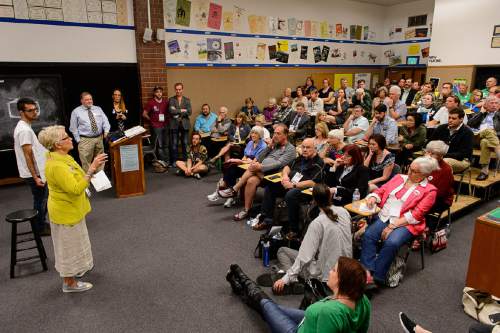This is an archived article that was published on sltrib.com in 2016, and information in the article may be outdated. It is provided only for personal research purposes and may not be reprinted.
Enthusiastic, but not well organized, a slate of Bernie Sanders supporters failed to unseat House incumbents at the Salt Lake County Democratic Convention on Saturday.
And in the county council's at-large race, upstart Kim Bowman nearly received enough delegate support to end the bid of Catherine Kanter, who has the backing of Mayor Ben McAdams and the four Democratic council members. The two will compete in a primary election.
Within Utah's minority party, such contested races are rare, and sent a shock through establishment circles. The contests didn't turn necessarily on issues as much as style, length of service and presidential politics.
The legislative candidates running as part of the United Progressive Coalition argued that they could harness the enthusiasm of Sanders' presidential bid to grow the party and eventually pull this conservative state to the left. On March 22, Sanders received 77 percent of the vote in the state's caucuses, where the delegates to the county convention were also elected.
None of these first-time candidates were well versed in party rules or had potential delegates lined up, as a result they were at a severe disadvantage against sitting lawmakers who not only are better organized, but well known within the Democratic establishment.
Darin Mann, who founded the coalition, actually withdrew from his race before the vote and endorsed Rep. Rebecca Chavez-Houck, D-Salt Lake City.
Mann said he "didn't want a divisive campaign. I'm all about unity." He called Chavez-Houck a "good legislator" worthy of support and said he'd focus his energy on building the coalition.
Chavez-Houck said Mann was gracious and added: "If he's enthusiastic about helping us and helping the party, I'm ready to roll up my sleeves and work with him."
Rep. Carol Spackman Moss, D-Holladay, claimed 90 percent of the delegate vote in her race against Aubrey Lucas, an information technology specialist. Lucas argued that Moss' 16-years in the Legislature has been enough and that she was better suited to keeping new voters engaged.
Moss countered by saying: "It shouldn't be about new voices or older voices, it should be about more voices. Let's get more Democrats elected."
Moss, a retired teacher, was surprised by the intra-party challenge, as were the other incumbents, who had no contact with their opponents before they filed for office.
"It was stressful but it was a good experience in electoral democracy," she said.
Rep. Lynn Hemingway, D-Millcreek, received the support of 72 percent of delegates in his contest against nurse Alexis Hall.
"It went better than I thought," he said, indicating how seriously the incumbents took the challenge from the progressive coalition.
The challengers often brought up Sanders and tied their campaigns to some of his positions, such as a call for free higher education, health care for all and campaign finance reform.
In responding to delegates, Hemingway wouldn't say if he preferred Sanders to front-runner Hillary Clinton, only that he'd support the party's eventual nominee.
Suzanne Harrison also beat coalition-member Mark Hammond for the right to challenge Rep. LaVar Christensen, R-Draper.
The only coalition member to score a victory on Saturday was Edgar Harwood, who beat Scott Thorell. Harwood will face either Rep. Earl Tanner, R-West Jordan, or his Republican challenger, Adam Gardiner, in November.
The delegates waded into presidential politics even further by passing a non-binding resolution urging Utah's four Democratic superdelegates to support Sanders, since he won a big majority in the state. Two superdelegates — Utah Democratic Party Chairman Peter Corroon and Wayne Holland, the state's national committeeman — are Sanders supporters, while the other two — Breanne Miller, the state party's vice chairwoman, and Rep. Patrice Arent, Utah's national committeewoman — are supporting Clinton.
The county council race was the most competitive and has high stakes. The Democrats hope to defeat Councilman Richard Snelgrove in November and win a majority of seats.
County elected officials and party insiders have lined up behind Kanter, who with her husband Josh, helped create the progressive group, Alliance for a Better Utah. They are also prominent Democratic donors.
But in morning caucus meetings and in his speech to the convention attendees, Kim Bowman made a strong impression. He's an attorney who works at the University of Utah and is a captain in the Air Force Reserves JAG Corps.
He said his military experience and small-business background made him better suited to take on the Republican incumbent.
After two rounds of balloting, Bowman claimed 56 percent of the delegate vote, short of the required 60 percent to win the nomination outright.
"I'm thrilled we had a voice and it seems to be connecting," Bowman said.
Kanter said she was happy to make it to the primary ballot and said she was the best suited to ultimately claim the seat.
"I have the broad reach and experience to win in the fall," she said.
Before the final results were read, Kanter and Bowman had a tense exchange over some Facebook posts. Jeff Dixon, a former executive director of the Salt Lake County Democratic Party, called Kanter an "ultra wealthy donor" and insinuated that she's received the support of prominent politicians, like McAdams, because of past contributions.
"We are all Democrats. We should all be on the same side and run clean campaigns," Kanter said, complaining about "personal attacks coupled with coded language."
Bowman said he has asked Dixon to delete the Facebook posts and apologize.
"I want to be positive and above board," he said. "I see us as on the same team."
Still, he said the campaign will not shy away from talking about money in politics.







